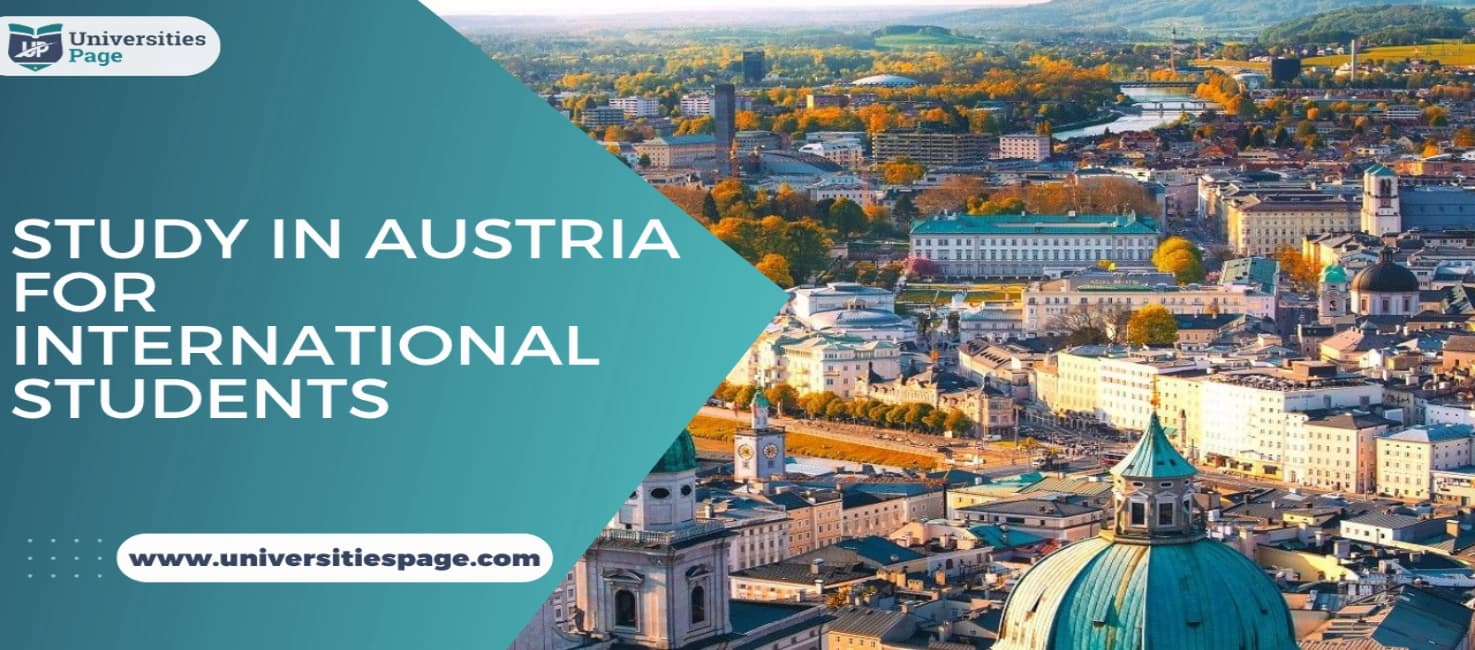Loading article...
Preparing your reading experience
Loading article...
Preparing your reading experience

Study in Austria for international students. Austria is a fantastic destination for foreign candidates, and it is popular due to its world-class education, safe environment, variety of programs, affordable fees, and beautiful culture. In Austria, the most famous study cities are Innsbruck, Vienna, Linz, and Salzburg. Additionally, there are 16 private institutes, 22 public sector institutes, 20 applied sciences institutes, and three medical institutes. The teaching languages in Austria are German and English. More than 200 programs are taught in English here.
Official English tests that are accepted by Austrian institutes are IELTS, TOEFL, PTE, and C1 advanced. Austrian universities offer a wide range of programs, such as tourism, engineering, management, international business, and health economics. The tuition fee varies according to the university. In public universities, it is around 726 EUR per semester; in private institutes, it is approximately 1,500 to 17,800 EUR per semester; and in applied sciences institutes, it is about 727 to 17,600 EUR per semester. IELTS is optional, but some universities require a 6.0 to 6.5 band score. In some universities, it is not needed.
Fully and partially funded scholarships are offered to foreign applicants. Austria allowed part-time jobs for 20 hours weekly for master's programs and 10 hours weekly for bachelor's students. The average monthly cost study in Austria for international students is about 700 to 1200 EUR, which covers meals, transport, accommodation, and other utilities. A bank statement of 7,400 EUR per year is required for 24-year-old students, and 13,350 EUR yearly is required for students under 24. The success visa ratio is 80% to 90% for international students.
|
Key Information for Study in Austria |
|
|
Teaching Language |
German, English |
|
Top universities in Austria |
|
|
Top Scholarships in Austria |
|
|
Scholarships |
Yes |
|
Scholarship Type |
Partially and fully funded |
|
Education requirement |
HSSC for bachelors Bachelors for masters |
|
Course duration |
|
|
Offered courses |
|
|
Embassy location |
7 A Street 21, F-8/2 F 8/2 F-8, Islamabad,
Islamabad Capital Territory |
|
Average tuition fee |
Public institutes: 726 EUR per semester Private institutes: 1,500 to 17,800 EUR per
semester. Applied sciences institute 727 to 17,600 EUR per semester. |
|
Average monthly cost |
700 to 1200 EUR |
|
IELTS Requirements |
Optional, but in some universities, it is a
6.0-6.5 band score |
|
Part-time Jobs |
Masters: 20 hrs. per week Bachelors: 10 hours weekly |
|
After study a work permit |
Allowed |
|
Bank statement |
For 24-year-old students: 7,400 EUR per
year Up to 24 years: 13,350 EUR yearly |
|
Admission and visa processing time |
4 to 5 months |
|
Success visa ratio |
80-90% |
There are various benefits to study in Austria, given
below:
Many world institutes, such as Vienna University, are known
for their educational excellence.
Study in Austria offers a wide range of courses, from engineering to
health economics, tourism, and management. With 22 public, 16 private, and 3
medical universities, there's a course for every interest and career path.
Austrian universities offer affordable tuition expenses; in
public universities, the tuition is around 726 EUR per semester.
Study in Austria is known for its safe environment, with a low rate
of crime. Amidst a world filled with protests, armed conflicts, and political
problems, studying in Austria offers a peaceful and secure experience.
Students can work part time for 10 and 20 hours per week for
bachelors and master's respectively. Additionally, their income can be around
800 to 1000 monthly. Post graduation work chances are also given to the
international students in [specific industries or sectors].
Many scholarships in Austria, such as the OeAD scholarship,
reduced the student's burden on studying fees.
Study in Austria provides a unique opportunity to immerse yourself in a rich cultural tapestry. From vibrant cultural scenes to breathtaking landscapes and historical sites, Austria is a cultural paradise waiting to be explored.
Austria gives many scholarships to international students; the top of them are given below:
This scholarship is given to undergraduate, master's,
research, and PhD candidates. OeAD offers joint excellence science and Ernst
Mach grant scholarships to PhD students. It covers tuition, travel, and living
costs.
This scholarship is for students who want to pursue higher
studies in Austria in fields such as technical, social, and natural sciences.
These are merit—and need-based scholarships that cover
living costs. Depending on the program level, the duration of the scholarships
offered is from 3 to 12 months.
This scholarship is for master's and doctoral study
programs. It also supports educational collaboration with Austrian institutes.
This fully funded scholarship is provided to all international students in study programs. Various institutes of Austria, like Vienna University, give funding opportunities to overseas applicants. The scholarships offered are in the arts, health, natural, agriculture, and social sciences. The scholarship mostly covers accommodation, transport, a monthly stipend, and health insurance expenditures.
This scholarship is offered to doctoral and PhD programs and
gives applicants more than 3,000 euros in scholarship grants. This university
is the world's leading center of research.
This partially funded scholarship is offered to master's and bachelor's level programs. It covers a tuition fee of about 21k EUR for one year. Eligibility criteria for this scholarship are English language proficiency, at least 3.0 GPA, recommendation letter, and essay writing.
This is a fully funded scholarship offered to postdoctoral
students. It is for around three years and is given to students whose past
education is related to chemistry, medicine, computer science, physics,
biology, or engineering.
|
World Ranking |
309 |
|
Acceptance rate |
29% |
|
Is IELTS required or
not |
Optional |
|
Average Tuition fee |
727 euros per
semester |
This is the third oldest Austrian university, founded in 1669. This public sector institute provides different courses such as technology, music study, economics, biology and textile education. Offered programs in this university are diplomas in math, MA, and M.Sc. The institute's important purpose is teaching, classes, and research, which support people in their future. Moreover, this university has a 309-world ranking, while IELTS is optional. The average tuition fee is about 727 euros per semester, with a 29% acceptance rate.
|
World Ranking |
137 |
|
Acceptance rate |
25-30% |
|
Is IELTS required or
not |
Optional |
|
Average Tuition fee |
726.73 euros per
semester |
This university is the oldest and largest university in middle Europe. It was established in 1365. It has more than 45k students and 178 disciplines such as humanities, inherent sciences and sociology. This is the public university that offered M.Sc. MBA and MS programs. 137 world-ranked university. Moreover, IELTS is optional. The average tuition fee is around 726.73 euros per semester. The acceptance rate is 25-30%.
|
World Ranking |
190 |
|
Acceptance rate |
30% |
|
Is IELTS required or
not |
Yes, 6.5 band |
|
Average Tuition fee |
1620 euros per
semester |
This public-sector university was founded in 1815. It is popular due to its engineering discipline. The university offers BA, M.Sc., MA, and B.Sc. programs. Notable alumni are Fritz Lang and Wilhelm Steinitz. This is a 190-ranked university. Furthermore, the university has an acceptance rate of 30% and an IELTS score of 6.5 band. The average tuition cost is about 1620 euros per semester.
|
World Ranking |
413 |
|
Acceptance rate |
20-30% |
|
Is IELTS required or
not |
Yes, seven band |
|
Average Tuition fee |
1497 euros per
semester |
This is an excellent innovation and learning center. It is situated in Graz that is a vibrant city well known due to its reasonable living cost. It was founded in 1811. The level of studies offered in this university is undergraduate and master's in science and technology areas. Notable alums are Karl von Terzaghi and Nikola Tesla. Furthermore, this university has a world ranking of 413 with an acceptance rate of 20-30% and an IELTS demand of 7.0. The average tuition fee is around 1497 euros per semester.
|
World Ranking |
472 |
|
Acceptance rate |
56% |
|
Is IELTS required or
not |
Yes, 6.0 or above |
|
Average Tuition fee |
726.72 euros per
semester |
It is a public-sector university established in 1966. It offers BBA, MBA, BA, MA, B.Sc., and M.Sc. programs in different courses such as law, medicine, economics, business, engineering, computer science, and social sciences. Notable Alumni are Volker Türk and Reinhold Mitterlehner. Additionally, the average tuition cost is about 726.72 euros per semester. The university has a 472-world ranking, and IELTS requires a 6.0 band score. The acceptance rate of this university is about 56%.
The basic admission documents required are as follows:
There are the following basic documents that are needed for
the student visa process:
The Austrian study visa process is easy. Here are some tips
for candidates to get a student visa in Austria.
Study in Austria is affordable for foreign students. The average
monthly living cost in Austria is about 900 to 1200 EUR for international
students, which covers meals, transport, accommodation, and other utilities.
However, the tuition fee is about 3k to 23k EUR per year.
Austria offers part-time jobs for 20 hours weekly to
master's program students and 10 hours weekly to bachelor's students. These
jobs include retail, tutoring, hospitality, online work, and internships.
After graduation, a residence permit is offered for one
year. During this time, students can find suitable jobs. After securing a job,
students can work and live in Austria by applying for a red-white-red card.


Mahnoor is a seasoned visa consultancy professional with over 11 years of hands on experience guiding Pakistani students toward successful study abroad journeys. Her expertise spans international education systems, student visa regulations, and global immigration frameworks, making her a trusted voice in the study abroad industry. Over the past 11 years, Mahnoor has worked closely with students, parents, educational institutions, and international partners to simplify complex visa processes and ensure compliance with ever changing immigration laws. Her deep understanding of country-specific visa requirements enables him to provide accurate, up to date,...
Read moreDiscover more insightful articles about global education and study abroad opportunities
_1772535983504.webp&w=3840&q=75)
Convincing your parents to support your decision of studying abroad can feel like a hard decision, especially when they are apprehensive or even stressed about the prospect of you living abroad.

Determining how much study gap is acceptable in the USA requires a clear understanding of the overview of study patterns and breaks among students. Whether a gap year occurs after high school or post-graduation, it is common for students to take a break for personal reasons, medical reasons, or to focus on entrance exams and preparation that can improve their chances of getting admitted to a better university.

When preparing a bank statement for a UK student visa from Pakistan, it’s crucial to have a properly maintained bank statement for the UK showing sufficient funds to cover your tuition fees, living expenses, and maintenance funds for the first academic year, ensuring the total funds remain stable for the full 28-day period as required by UKVI.
Engage with our community of students and education experts. Your insights matter!
Share your thoughts with the community
No approved comments yet. Share your thoughts!